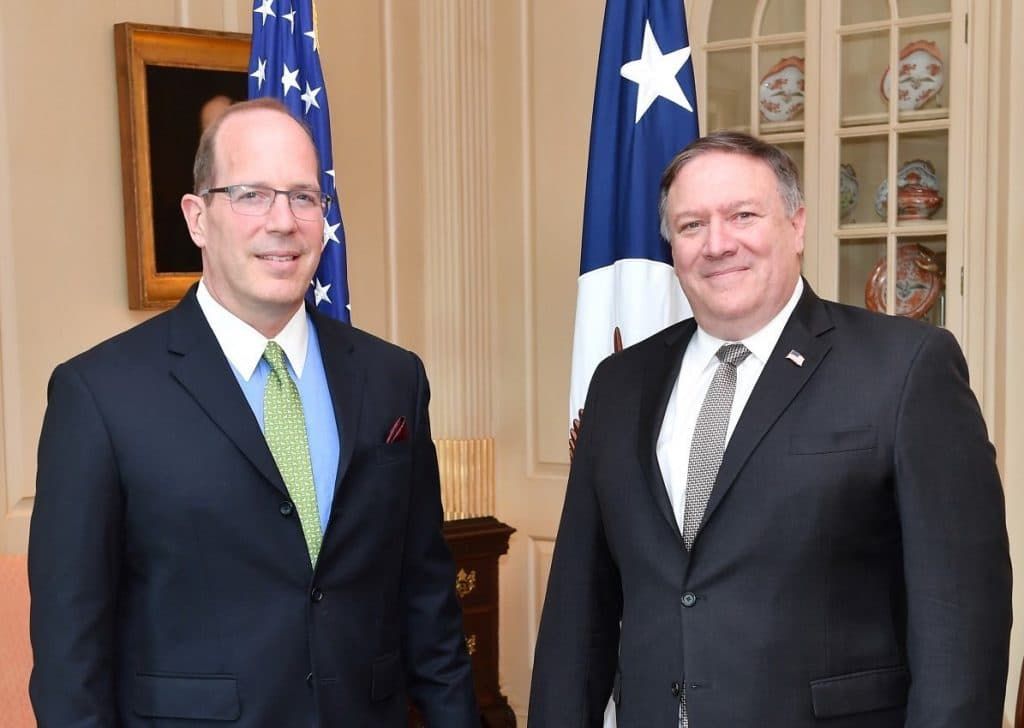Trump appointee wants “arms control for adults.” Experts couldn’t agree more.
By Sharon Squassoni | March 2, 2020
 Christopher Ford and Mike Pompeo, 2018. Photo credit: US State Department.
Christopher Ford and Mike Pompeo, 2018. Photo credit: US State Department.
Many Washington experts welcomed the appointment of Chris Ford to the position of Assistant Secretary of State for International Security and Nonproliferation in 2017. In an administration famous for installing officials with little or no previous experience related to their jobs, Ford is a rare exception. Not only is he a Washington insider willing to work for Trump; he has actually handled similar issues in previous administrations, and his views are well-documented in publications from his time in the think tank community. He is a Rhodes Scholar, with degrees from Harvard, Yale, and Oxford, no less.
While other Trump appointees are struggling to learn the ropes of government, Ford has been speaking at every opportunity about nuclear arms control and nonproliferation. (He gave 29 speeches in 2019.) Normally, nuclear experts would welcome the attention to arms control, since silence about a policy area can mean that it is a low priority, or that there is no progress to publicize.
The transparency of Ford and the State Department is especially remarkable because nothing is afoot in arms control, and no nonproliferation deals for Iran or North Korea are in the making. With free time on his hands, Ford is attempting to disarm his critics rather than create real solutions to persistent problems. Ironically, many of his critiques fall flat not just because they defy the facts and logic, but because they could also be quite accurately directed at the very administration he serves.
In February, in what seemed a deliberate attempt to provoke, Ford delivered a speech in London at the Institute for International Strategic Studies (IISS) that offered a cartoonish vivisection of “certain circles” of Western civil society organizations and diplomats that are engaged in arms control and disarmament. In Ford’s view, these types of groups and people are “in thrall” to a strain of identity politics that compels them to advocate not just for arms control but also for nuclear disarmament. This infatuation results in “bad habits” and “poor choices”—a stark contrast from the “arms control for adults” that Ford endorses, which pursues security above all. While the infantilizing of nuclear policy experts who have spent their lives doing something more than pursuing money or profit is unfortunate and sure to earn Ford less respect than he might otherwise deserve, there are other disturbing elements in Ford’s speech that deserve attention.
Ford essentially claims that civil society—that is, think tanks, academic institutions, and nonprofit advocacy groups—has become a tool of nuclear-armed dictatorships. His logic: Democracies can be influenced by civil society, but dictatorships cannot. Therefore, civil society weakens democracies.
On its face, the assertion is nonsensical. Superficially, Ford is correct on one point: It is harder to govern in a democracy, with many voices and points of view, than it is to run an authoritarian regime that can ignore or silence dissent. But Ford goes to almost comical lengths to criticize the attachment that arms control advocates have to nuclear disarmament, because in his view, any sane person wouldn’t advocate such a thing, and such advocacy somehow hamstrings the US government on nuclear policy. His signature initiative, “Creating the Environment for Nuclear Disarmament,” in contrast, is a process that could last forever, and is probably meant to, since its designer believes that nuclear weapons bestow security rather than create risks.
Rather than treating his assumption as a hypothesis and attempting to find evidence to support it, Ford excoriates those who operate with a different hypothesis. But Ford has a problem: The population of experts who believe that nuclear weapons are an extremely risky business is diverse and growing. It includes Republicans and Democrats, prominent civil servants and distinguished military officials. Beyond the four statesmen (former Secretary of Defense William Perry, former Senator Sam Nunn and former Secretaries of State Henry Kissinger and George Schulz), prominent American signatories to the Global Zero initiative include former Secretary of Defense Frank Carlucci, former Secretary of State Larry Eagleburger, and retired American generals James Cartwright, Merrill McPeak, and Anthony Zinni. This is not exactly a list of individuals who have drifted into what Ford calls the “realm of fantasy and visible sainthood” of radical left politics.
Though his arguments are unpersuasive, it is easy to understand why Ford is using them in his odd attacks on critics of the Trump administration.
First, he seems to have an unshakeable belief that the United States, Russia, and China are in a fight to the death. Softer tools of power such as democratic traditions, innovation, transparency, and openness don’t seem to play a role in Ford’s worldview. That’s apparently why he spent much of his IISS speech bemoaning civil society’s criticism of the failure of the United States to engage in meaningful arms control dialogues. Following Fordian logic, civil society’s addiction to nuclear identity politics clouds the real security issues standing before it. If only civil society would stop complaining to its democratic governments about their failed policies, those governments would be able to fight might with might.
Second, Ford seems to have a need to attack what he likely fears most about the Trump administration. Ford protests in a December 2019 speech that “serious policymaking isn’t identity-political performance art.” He distinguishes between real policy decisions and “simply impressing one’s social media followers or political constituents, or delivering propaganda points at a conference.” One wonders what value Ford places on the performance art that negotiations with the North Koreans have become. In fact, the “performative politics” phrase that he uses repeatedly to indict the motives of arms controllers much more accurately describes the Trump administration than the arms control community.
Evidence supporting Ford’s fears about disarmament advocacy wreaking havoc on democracies is all but nonexistent. Despite criticism from a variety of arms control and disarmament experts, the United States has not cancelled any nuclear modernization programs, any new warheads, or any new platforms. No Western countries that depend on nuclear weapons (either their own or via extended deterrence) have yet succumbed to the Treaty for the Prohibition of Nuclear Weapons, signed in 2017. President Trump may not know such a treaty exists, but the United States has opposed it from the very beginning.
Unfortunately, the Trump narrative of great power competition and resurgence of American power leaves little room for serious arms control progress. Easy steps like extension of New START are inexplicably delayed, although the treaty perfectly matches Ford’s description of “good agreements” that verifiably constrain their parties. Trump’s rejection of the Iran nuclear deal—which also matches Ford’s good agreements description—was completely based on identity politics rather than security interests. Iran’s actions since the United States pulled out of the deal have decreased, not increased, US security. Yes, the arms control community has mourned the demise of the Intermediate-Range Nuclear Forces (INF) Treaty, because its dissolution carries the very real risk of a proliferation of medium-range land-based ballistic missiles by the United States and Russia. But instead of proposing solutions to avoid that arms race, the Trump administration has welcomed its new ability to field new missiles against China.
Arms control for adults would include the following menu: immediate extension of New START and the opening of a dialogue with Russia to determine next steps in improving strategic stability, limited not just to strategic nuclear weapons but also codes of conduct in space and cyberspace; a moratorium on new land-based nuclear-capable missiles in Europe and a new trilateral dialogue with Russia and China on missile deployments and missile defenses; multilateral negotiations with North Korea to increase pressure on Kim Jong-un to reduce elements of his nuclear program with a goal to coming back into the Nuclear Nonproliferation Treaty; and a return by the United States to the Iran nuclear deal, with additional dialogues on missile and terrorism threats in the Middle East.
There is no excessive moralizing or identity politics in this menu, just an acknowledgement that the nuclear risks facing the United States require the cooperation of many parties. As the Trump administration continues its own unserious approach to arms control, experts in the US arms control community will continue to exercise their political birthright of free speech to argue for sensible security that, instead of building up numbers of nuclear weapons, missions, and platforms, reduces the most perilous risks of the current nuclear landscape.
Editor’s note: This story has been updated.
Together, we make the world safer.
The Bulletin elevates expert voices above the noise. But as an independent nonprofit organization, our operations depend on the support of readers like you. Help us continue to deliver quality journalism that holds leaders accountable. Your support of our work at any level is important. In return, we promise our coverage will be understandable, influential, vigilant, solution-oriented, and fair-minded. Together we can make a difference.
Keywords: Trump administration, US State Department, arms control, nonproliferation
Topics: Nuclear Risk, Opinion














